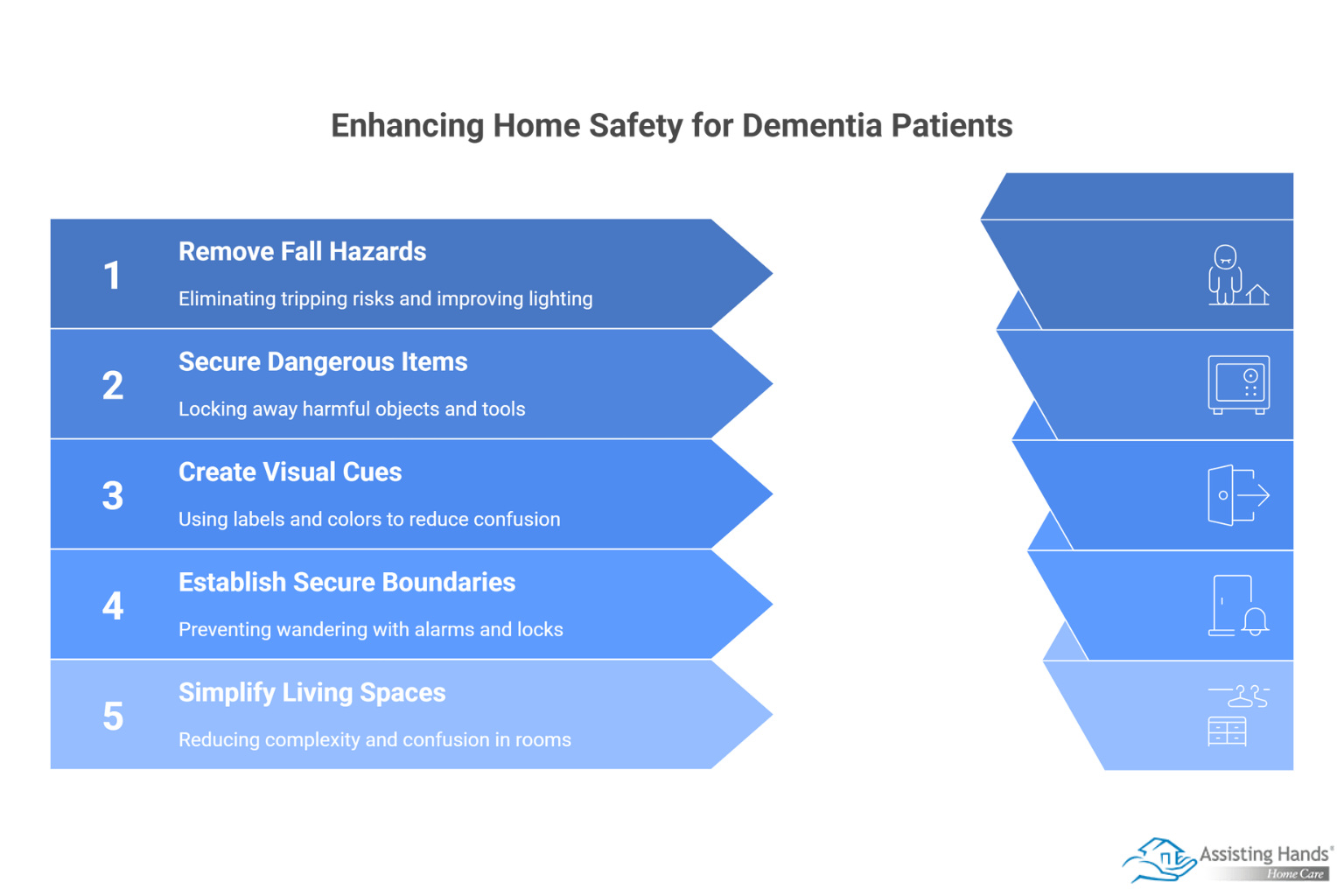
Table of Content
Creating a secure, comfortable living space for a senior loved one with dementia requires thoughtful planning and ongoing adjustments. A well-designed home environment can significantly reduce confusion, prevent accidents, and help your loved one maintain independence for as long as possible.
Remove Fall Hazards and Enhance Lighting
Falls represent one of the most serious safety risks for people with dementia. Poor depth perception and impaired judgment make navigating household obstacles increasingly difficult as the condition progresses.
Start by eliminating common tripping hazards throughout the home:
- Remove or secure loose rugs and runners.
- Clear walkways of furniture, electrical cords, and clutter.
- Install sturdy handrails on both sides of staircases.
- Add nonslip strips or mats in bathtubs and showers.
- Ensure all areas have adequate lighting, especially hallways and bathrooms.
Motion-sensor lights can be particularly helpful for nighttime navigation. Consider installing them in bedrooms, bathrooms, and hallways to automatically illuminate paths without requiring your loved one to find light switches in the dark.
Replace burned-out bulbs immediately and increase wattage in commonly used areas. Good lighting reduces shadows and visual confusion that can contribute to falls or disorientation.

Secure Potentially Dangerous Items
People with dementia may forget how to safely use familiar household items or use them inappropriately. Securing potentially harmful objects protects both your loved one and others in the home.
Focus on these high-priority areas:
- Install safety locks on cabinets containing cleaning supplies, medications, and sharp objects.
- Remove or lock away power tools, lawn equipment, and automotive supplies.
- Consider removing knobs from stove burners or installing an automatic shutoff device.
- Secure firearms in a locked safe or remove them from the home entirely.
- Hide or remove matches, lighters, and candles.
Kitchen safety requires special attention, since cooking-related accidents are common. If your loved one continues cooking, consider replacing a gas stove with an electric model, which generally presents fewer safety risks. Remove small appliances that could cause burns or injuries if used incorrectly.
Caring for a loved one with dementia is a challenging task for anyone. The responsibilities can sometimes feel overwhelming, but help is available. Seniors can face a variety of age-related challenges. Though some families choose to take on the caregiving duties, there may come a time when they need a trusted Miami home care provider. Families sometimes need respite from their duties so they can focus on their other responsibilities, and some seniors need around-the-clock assistance that their families are not able to provide. Assisting Hands Home Care is here to help.
Create Clear Visual Cues and Reduce Confusion
Environmental modifications can help your loved one navigate the home more independently and feel less anxious about daily activities.
Use these strategies to enhance orientation and reduce confusion:
- Label doors, drawers, and cabinets with both words and pictures.
- Use contrasting colors to distinguish different areas or objects.
- Keep frequently used items in consistent, easily accessible locations.
- Remove or cover mirrors if they cause distress or confusion.
- Display large, easy-to-read clocks and calendars in main living areas.
Consider painting bathroom doors a distinctive color or adding clear signage to help with identification. Some families find placing a photo of a toilet on the bathroom door helps more than a written label.
Remove or minimize decorative items that might be mistaken for something else. Realistic artificial flowers or fruits, for example, might be confusing to someone who tries to eat them.
The cognitive challenges that accompany dementia often leave aging adults unable to manage everyday tasks, which puts their safety and health at risk. If your senior loved one has been diagnosed with a serious condition and needs help with tasks like meal prep, transportation, bathing, and grooming, reach out to Assisting Hands Home Care, a leading provider of in-home care families can trust. We also offer comprehensive care for seniors with dementia, Alzheimer’s, and Parkinson’s.
Establish Secure Boundaries and Monitoring
Wandering and getting lost represent significant safety concerns for people with dementia. Creating secure boundaries while maintaining comfort requires balancing safety needs with personal dignity.
Consider these approaches for managing wandering behavior:
- Install deadbolt locks higher or lower than usual on exterior doors.
- Use door alarms or sensors that alert when doors are opened.
- Create engaging spaces near exits to redirect attention away from leaving.
- Ensure your loved one carries identification with current contact information.
- Consider GPS tracking devices designed for people with dementia.
Window security also matters, especially for upper-floor bedrooms. Install locks or stops that prevent windows from opening wide enough for someone to fall through while still allowing fresh air circulation.
Some families find placing large stop signs on doors or using childproof door handles can be effective deterrents without making their loved ones feel trapped.
Simplify Daily Living Spaces
Reducing complexity in living spaces can minimize confusion and support continued independence with daily activities.
Focus on these simplification strategies:
- Keep only essential items visible in each room.
- Organize closets so appropriate seasonal clothing is easily accessible.
- Use automatic faucets or lever-style handles instead of knobs.
- Replace complex remote controls with simplified versions.
- Maintain familiar furniture arrangements and avoid unnecessary changes.
In the bedroom, consider using a commode at night if bathroom access becomes difficult. Ensure the path between the bed and bathroom remains clear and well lit.
Remove or simplify electronics that might become confusing. A radio with large, simple buttons may be more appropriate than a complex stereo system with multiple functions.
The goal is creating an environment that feels familiar and manageable while providing necessary safety features. Regular assessment and adjustment ensure the home environment continues meeting changing needs as dementia progresses.
Aging in place can present a few challenges for seniors living with dementia. However, they can still live independently at home with the help of professional dementia care. Miami families can rely on Assisting Hands Home Care to provide their elderly loved ones with mental and social stimulation, timely medication reminders, assistance with meal prep, and much more. Our caregivers are available around the clock to help your loved one live a happier and healthier life. Reach out to one of our Care Managers today.
